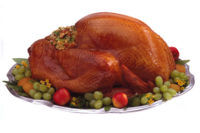State of the Industry 2023: Turkey
Industry expects a strong 2024
Vigilance on HPAI remains a priority.

Opening image credit: GettyImages / luvhotpepper / Royalty-free / iStock / Getty Images Plus
The U.S. turkey industry has once again shown resilience amid a whirlwind year. The continuation of an unprecedented highly pathogenic avian influenza outbreak, the drafting of the 2023 Farm Bill, food safety initiatives, and various efforts to promote turkey products at home and abroad have kept the U.S. turkey industry more than busy. With the end of 2023 fast approaching, the National Turkey Federation is glad to say the industry is positioned for what promises to be a strong year ahead.
When HPAI struck in February of 2022, nobody anticipated how long the outbreak would last or how widespread detections would be. With stronger, more heat-resistant strains than the 2015 outbreak, detections were rampant in commercial poultry farms across the globe. Utilizing strategies developed with information gathered during the 2015 outbreak, the turkey industry immediately took action to mitigate impacts of the disease.
NTF members had done a good job using 2015 data to enhance biosecurity measures that further limited the spread of the virus. NTF and the government also were able to draw on the 2015 experience to even more swiftly address outbreaks, provide indemnity to growers, and return to production at normal levels as soon as possible. The turkey industry’s strong commitment to safeguarding the industry, coupled with an effective, well-funded government response, has helped the virus fade during the summer months this year and is allowing the industry to shift its focus to HPAI recovery and prevention.
However, the virus is still in the wild bird population, and changes in the virus continue to present unique challenges in curtailing avian influenza. NTF has worked closely with the U.S. Department of Agriculture to ensure the resources are available to continue surveilling all major flyways. This is an early warning system to help prepare the industry for emerging virus threats, and NTF appreciates USDA’s commitment to the program.
To further bolster the recovery and biosecurity of turkey farms and prepare for any future outbreak, NTF is diligently working to address animal health and disease prevention priorities by urging Congress to pass the Foreign Animal Disease Prevention, Surveillance, and Rapid Response Act of 2023, among other pertinent bills, in the 2023 Farm Bill. This proactive, bipartisan bill will ensure the animal agriculture industry is well-equipped to immediately respond to a crisis by renewing funds for the three-tiered prevention, surveillance, and rapid response funding programs initially passed in the 2018 Farm Bill: the National Animal Disease Preparedness and Response Program (NADPRP), the National Animal Health Laboratory Network (NAHLN) and the National Animal Vaccine and Veterinary Countermeasures Bank (NAVVCB). NTF led the charge in gaining federal support for these programs back in 2018 and is committed to continuing its work alongside Congress and USDA to ensure turkey growers have access to enhanced tools and resources needed to effectively prevent, identify, and respond to animal health threats such as HPAI.
On the food safety front, NTF remains committed to working with its members and food safety partners to address Salmonella in poultry products and identify scientific and technological innovations that will help NTF reduce naturally occurring pathogens in turkey products. NTF members take pride in providing safe, nutritious products to consumers and proactively working to further advance public health. NTF has provided feedback on proposed rules and efforts, including FSIS’ Proposed Regulatory Framework to Reduce Salmonella Illnesses Attributable to Poultry, to ensure policy is based on science-driven principles. NTF anticipates FSIS will publish a proposed rule on Salmonella that covers a broader scope of poultry products, including turkey, in the coming months, and the federation will remain actively engaged in this evolving effort.
Amid an ever-changing protein marketplace, the turkey industry has prioritized investing in the future of the industry and identifying new markets and audiences for turkey products. Part of NTF’s expanded focus on exports is bringing turkey to new customers in places such as India, Australia, and Latin America. In May, NTF and a cohort of its members traveled to South America to promote and grow turkey business with partners in Latin America and the Caribbean. The group witnessed promotional activities in grocery stores and fitness centers in addition to other public-facing events geared toward furthering turkey education. Challenges remain in all these markets, but NTF looks forward to expanding its efforts to provide a healthy, lean protein option to consumers abroad by cultivating valuable key trade relationships, updating existing trade agreements, and navigating existing sanctions.
Promoting turkey in the barbecue space also remains a top focus for NTF. Turkey soaks up any flavor, making it a suitable addition to the barbecue lineup for professional pitmasters and home enthusiasts alike. This year, Turkey Smoke, NTF’s barbecue series in partnership with the Kansas City Barbeque Society, has had more than 600 barbecue teams compete in 15 competitions, and has made several debuts at various barbecue festivals such as the Denver BBQ Festival and Kansas City Q BBQ Fest. NTF is also focused on spurring demand for turkey products by harnessing the power of social media and bringing recipes and creative meal ideas right to consumers’ fingertips. NTF and its members will continue to actively engage consumers and put turkey on the menu.
NTF is grateful for the hard work and dedication of the men and women on the farm, in the plant, and everywhere in between who play a role in the production, processing, and delivery of turkey products, especially these past years, as we have battled HPAI head on. The state of the turkey industry is strong, and we look toward 2024 with optimism.
Joel Brandenberger is president of the National Turkey Federation.
Looking for a reprint of this article?
From high-res PDFs to custom plaques, order your copy today!




